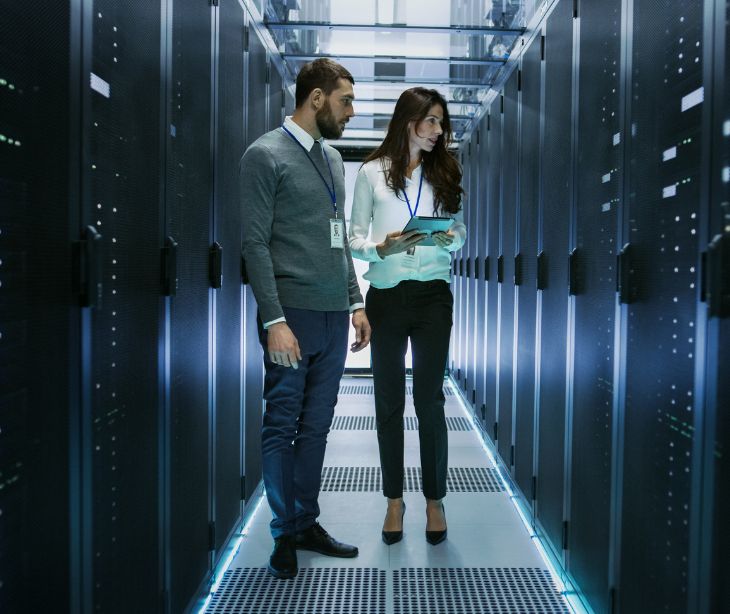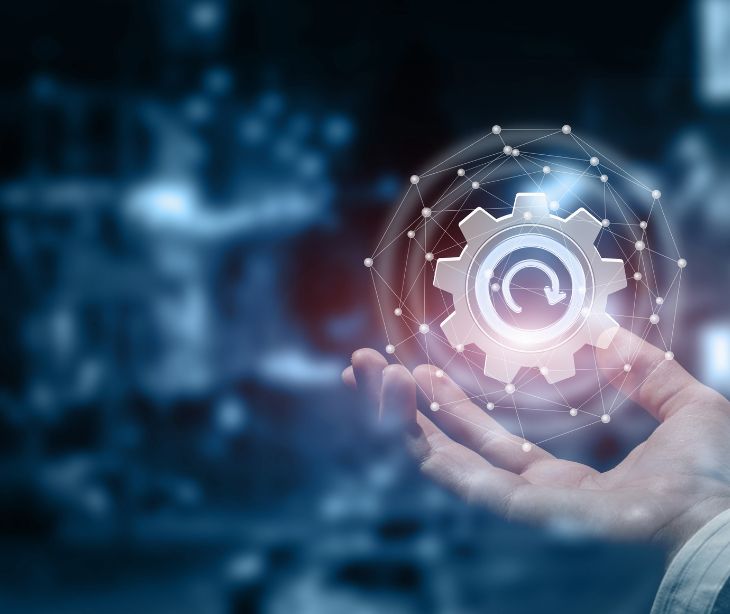
A data center is a facility that houses computer systems and associated components, such as telecommunications and storage systems. It provides a controlled environment for the reliable operation of these systems, ensuring the availability, security, and efficiency of data processing and storage.
Why are data centers important?
Data centers are necessary for various industries and organizations that rely on storing and processing large amounts of data. They enable businesses to store data securely, scale their operations, and ensure uninterrupted access to critical information. Data centers also support cloud computing, big data analytics, artificial intelligence, and other emerging technologies that require advanced computational power and storage capacity.
Read also: Where are the Paubox data centers?
How do data centers work?
Data centers consist of various components, including servers, networking equipment, storage systems, cooling systems, and power infrastructure. These components work together to ensure the seamless operation of the data center.
Servers
Servers are the heart of a data center. They are powerful computers that process requests, store and retrieve data, and provide various services. Multiple servers are typically housed in racks, which are organized in rows within the data center.
Networking equipment
Networking equipment, such as switches and routers, enables communication between servers, storage systems, and external networks. It ensures the efficient flow of data within the data center and enables connectivity to the internet and other networks.
Storage systems
Storage systems are responsible for storing and retrieving vast amounts of data. They can range from traditional hard disk drives to solid-state drives and network-attached storage devices. Data redundancy and fault tolerance mechanisms are implemented to ensure data integrity and availability.
Cooling systems
Data centers generate a significant amount of heat due to the high-density server configurations. Cooling systems, such as air conditioning and liquid cooling, are employed to maintain optimal temperature and humidity levels, preventing equipment from overheating and ensuring reliable operation.
Power infrastructure
Data centers require a reliable and redundant power supply to ensure uninterrupted operation. Power infrastructure includes backup generators, uninterruptible power supplies, and power distribution units. These systems provide backup power in case of power outages and ensure a stable power supply to the data center equipment.
Types of data centers
Data centers can be classified into different types based on ownership, purpose, and service offerings. Let's look at three common types of data centers:
Enterprise data centers
Enterprise data centers are owned and operated by individual organizations to meet their specific data storage and processing needs. These data centers are typically located on-premises and provide dedicated infrastructure for the organization's internal use.
Colocation data centers
Colocation data centers are facilities that provide space, power, cooling, and physical security for businesses to house their IT infrastructure. In a colocation data center, multiple organizations share the same facility, reducing costs and providing access to powerful infrastructure.
Cloud data centers
Cloud data centers are massive facilities that cloud service providers operate to deliver cloud computing services to customers. These data centers house a vast number of servers and storage systems to support the scalability and flexibility requirements of cloud-based services.
Key considerations in data center design
Designing a data center involves various considerations to ensure its efficiency, reliability, and security. Let's look at some key considerations in data center design:
Scalability
Data centers should be designed with scalability in mind to accommodate future growth and changing business needs. Scalable infrastructure, such as modular server racks and expandable cooling systems, allows data centers to easily scale their capacity as demand increases.
Redundancy
Redundancy ensures uninterrupted operation and minimizes the risk of single points of failure. Redundant components, such as power supplies, network connections, and cooling systems, are implemented to provide backup in case of failure.
Security
Data centers handle sensitive and valuable data, making security a top priority. Physical security measures, such as access controls, surveillance systems, and biometric authentication, are implemented to protect the data center from unauthorized access. Cybersecurity measures, including firewalls, intrusion detection systems, and encryption, are employed to safeguard data from external threats.
Energy efficiency
Data centers consume a large amount of energy, designing data centers with energy-efficient cooling systems, power management solutions, and server virtualization can result in substantial energy savings.
Read also: Data management in healthcare systems
Trends in data center technology
Data center technology is constantly evolving to meet the growing demands of the digital world. Let's look at some trends in data center technology:
Virtualization
Virtualization allows multiple virtual machines (VMs) to run on a single physical server, optimizing resource utilization and reducing hardware costs. Server virtualization is widely adopted in data centers to increase efficiency and flexibility.
Edge computing
Edge computing brings data processing and storage closer to the source of data generation, reducing latency and improving real-time data processing capabilities. Edge data centers are deployed at the edge of the network to support applications that require low latency and high bandwidth.
Green data centers
Green data centers focus on reducing energy consumption and environmental impact. Renewable energy sources, energy-efficient cooling systems, and advanced power management solutions are employed to achieve sustainability goals.
Hybrid cloud solutions
Hybrid cloud solutions combine private and public cloud infrastructures, allowing organizations to use the benefits of both. Data centers assist in developing hybrid cloud environments by providing the necessary infrastructure to securely connect and integrate private and public cloud resources.
Data centers in healthcare
Data centers enable efficient, secure, and compliant healthcare data management, supporting various applications critical for patient care, research, and operational efficiency.
- Electronic health records (EHRs): Storing and managing patient information securely.
- Medical imaging and PACS: Storing and retrieving medical images efficiently.
- Telemedicine and remote patient monitoring: Facilitating real-time data exchange between providers and patients.
- Healthcare analytics and big data: Analyzing large datasets for insights and improvements.
- Compliance and security: Adhering to regulatory standards for data protection.
- Disaster recovery and business continuity: Ensuring uninterrupted access to important systems.
- Clinical research and trials: Supporting secure storage and analysis of research data.
See also: HIPAA Compliant Email: The Definitive Guide
FAQs
What does the future hold for data centers?
The future of data centers will be characterized by advancements in technologies like AI, 5G, and quantum computing, driving the need for more powerful and efficient data centers.
Can I visit a data center?
Due to security reasons, public tours of data centers are not offered. However, virtual tours and photo galleries are available for viewing.
What does critical power mean?
"Critical" power or "IT load" often refers to the data center load that is consumed or is dedicated to IT equipment such as servers, storage equipment, and communications switches and routers.
What is a carrier-neutral data center?
A data center is said to be carrier-neutral if a customer can order cross-connections or communications services from any existing provider and the data center provider actively tries to court additional carriers into the facility.
What is data center containment?
Data center containment refers to strategies such as cold aisle containment or hot aisle containment to efficiently manage air distribution within the data center, aiming to lower power usage effectiveness.
Subscribe to Paubox Weekly
Every Friday we bring you the most important news from Paubox. Our aim is to make you smarter, faster.




